The AMD Ryzen 3 1300X and Ryzen 3 1200 CPU Review: Zen on a Budget
by Ian Cutress on July 27, 2017 9:30 AM EST- Posted in
- CPUs
- AMD
- Zen
- Ryzen
- Ryzen 3
- Ryzen 3 1300X
- Ryzen 3 1200
Benchmarking Performance: CPU Legacy Tests
Our legacy tests represent benchmarks that were once at the height of their time. Some of these are industry standard synthetics, and we have data going back over 10 years. All of the data here has been rerun on Windows 10, and we plan to go back several generations of components to see how performance has evolved.
All of our benchmark results can also be found in our benchmark engine, Bench.
3D Particle Movement v1
3DPM is a self-penned benchmark, taking basic 3D movement algorithms used in Brownian Motion simulations and testing them for speed. High floating point performance, MHz and IPC wins in the single thread version, whereas the multithread version has to handle the threads and loves more cores. This is the original version, written in the style of a typical non-computer science student coding up an algorithm for their theoretical problem, and comes without any non-obvious optimizations not already performed by the compiler, such as false sharing.
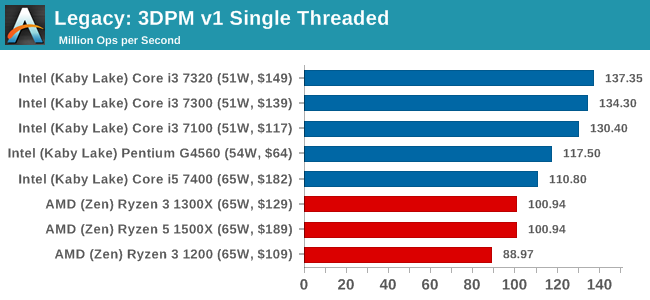
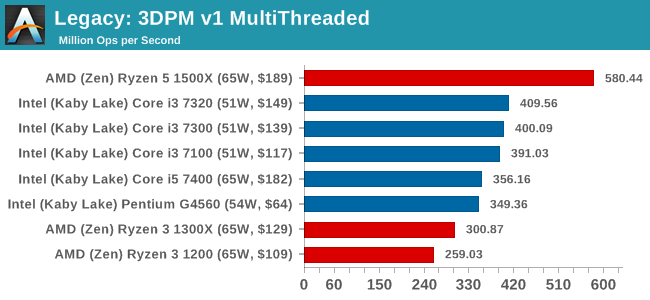
CineBench 11.5 and 10
Cinebench is a widely known benchmarking tool for measuring performance relative to MAXON's animation software Cinema 4D. Cinebench has been optimized over a decade and focuses on purely CPU horsepower, meaning if there is a discrepancy in pure throughput characteristics, Cinebench is likely to show that discrepancy. Arguably other software doesn't make use of all the tools available, so the real world relevance might purely be academic, but given our large database of data for Cinebench it seems difficult to ignore a small five-minute test. We run the modern version 15 in this test, as well as the older 11.5 and 10 due to our back data.
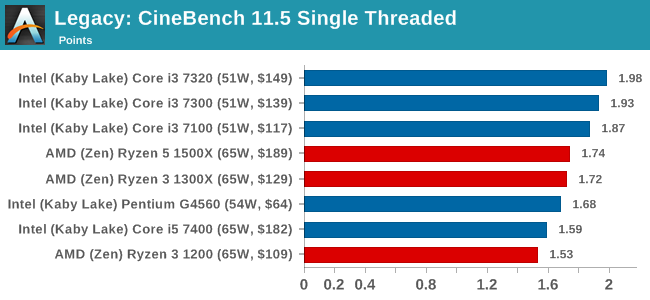
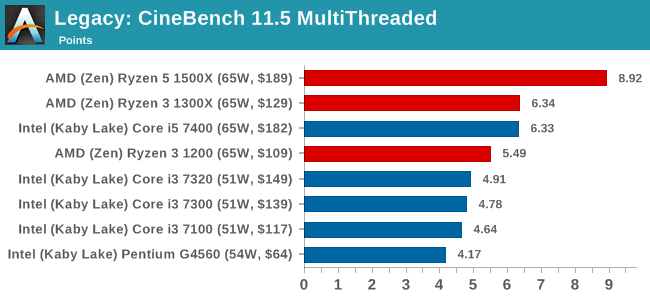
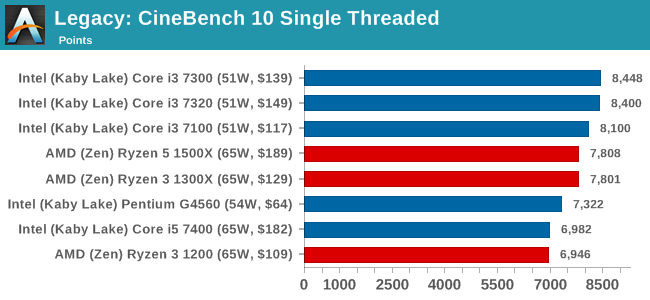
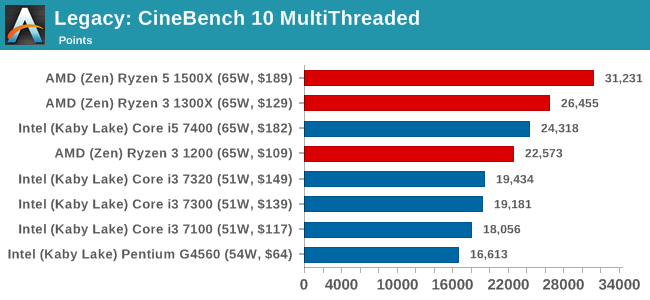
x264 HD 3.0
Similarly, the x264 HD 3.0 package we use here is also kept for historic regressional data. The latest version is 5.0.1, and encodes a 1080p video clip into a high-quality x264 file. Version 3.0 only performs the same test on a 720p file, and in most circumstances the software performance hits its limit on high-end processors, but still works well for mainstream and low-end. Also, this version only takes a few minutes, whereas the latest can take over 90 minutes to run.
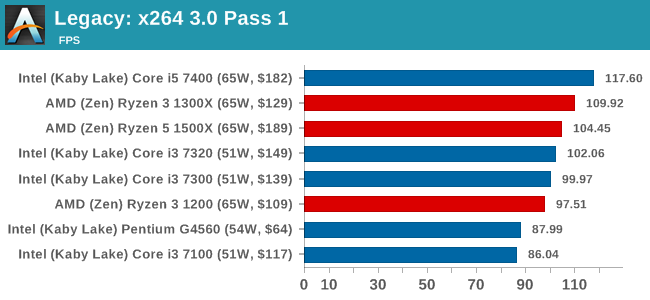
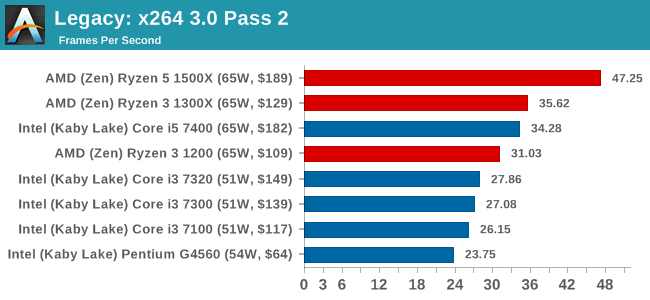










140 Comments
View All Comments
haukionkannel - Thursday, July 27, 2017 - link
You can install Ryzen 1200 and use Nvidia 1080ti and run games at 4K easily, so there is a point of these prosessors.There will be Ryzen based APU later in this or next year for Office computers and maybe even htpc usage and laptops. Those Are budget CPU for gaming and you can pair them as fast GPU as you like and still get reasonable good results!
The Intel 7700 is in the top, but if you run games at 4K I think that you can save a big deal by usin amd 1200 instead of Intel 7700! The difference is so small in speed and so big in money!
kaesden - Thursday, July 27, 2017 - link
dont forget that ryzen 1200 with a 1080ti could also have a 1700 dropped in down the line when budget allows, or when more cpu performance is needed. And the ryzen based APU's are coming eventually for those who just want basic integrated graphics. AMD isn't finished yet with their roll out.zodiacfml - Thursday, July 27, 2017 - link
The purpose is to make use/sell of disabled chips. This could be the reason why AMD and Nvidia started selling the new, lowest end discrete graphics cards. Desktop APUs will arrive early 2018.I wonder if AMD will ever have to cripple these Zen parts in the future as some articles mention they have high pretty good wields.
lefty2 - Thursday, July 27, 2017 - link
They aren't "making" a $100 CPU with no iGPU, they are just re-badging a $500 CPU. Much cheaper in research costs than having to design a new die. ...and the same logic applies to the 7700Kbennyg - Thursday, July 27, 2017 - link
I think the price/perf discussion should be a it broader in scope than just comparing CPU alone. The need to find or buy a GPU for the R3 compared to the Intel competition is a noticable omisson. Even the budgestest secondhandest GPUs will throw out the metrics of a $30 price comparison, but the extra graphics performance and/or features you may get from a dedicated GPU over iGPU should also be considered.bennyg - Thursday, July 27, 2017 - link
should be a *lot* broader. typoManch - Friday, July 28, 2017 - link
That's why these were tested with the higher end GPU's. To eliminate the IGP as a performance factor and compare CPU only. As you said, the extra performance you would get from even a low end discrete would be an unfair advantage for AMD. If you got one that was crappier than the IGP(if possible) then it would be an unfair advantage to Intel. It would be hard to decide which Discrete card would be the official stand in. On that note, doesn't AMD have discrete R7 cards that are paired with their APU's that are pretty much a copy of the IGP? They're not VEGA cores though so it wouldn't be a good way to predict the performance of the upcoming APU's. It would however give an idea as to what Bristol would have been using ZEN cores.extide - Saturday, July 29, 2017 - link
Latest AMD APU's are still construction cores (Excavator) with Polaris based graphics. Ryzen with Vega based will come later.Alexvrb - Thursday, July 27, 2017 - link
I don't know... maybe... gaming on a relatively small budget? Ryzen 3 plus a $150-200 graphics card is clearly better than an equivalent i3 build, plus they overclock even with a cheap B350 board.serendip - Friday, July 28, 2017 - link
For a cheapo gamer like me, Ryzen 3 + a $100 card is fine, but how big is that market anyway?AMD needs to go beyond servicing enthusiasts, it has to get OEMs to use Ryzen in cheap PCs for basic use in schools, homes and businesses. These segments won't bother going for Ryzen 5 or i5, they just want the cheapest computer available. AMD doesn't have a good name in the low end of the market because of its terrible APUs.